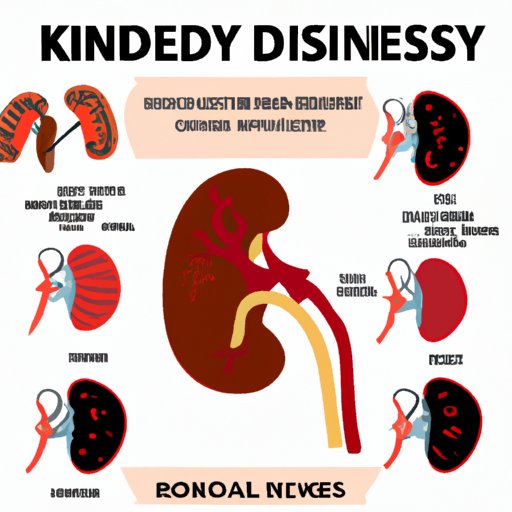
I. Introduction
Kidney disease is a serious health condition that affects millions of people worldwide. It occurs when the kidneys are damaged and can no longer filter waste and excess fluids from the blood effectively. Kidney disease can lead to various complications and ultimately, kidney failure. In this article, we will discuss the causes, prevention, and treatment of kidney disease, with a focus on outlining the factors that increase the risk of developing the condition and providing tips to manage the disease.
II. Causes of Kidney Disease
Chronic kidney disease is often caused by other health conditions that put pressure on the kidneys over time. The most common causes of kidney disease include diabetes, hypertension, and glomerulonephritis.
Diabetes is a leading cause of kidney disease. High blood sugar levels can damage the blood vessels and nerves in the kidneys, resulting in scarring and impaired kidney function.
Hypertension, or high blood pressure, gradually damages the kidneys’ blood vessels, leading to reduced blood flow and eventually kidney damage.
Glomerulonephritis is a group of diseases that cause inflammation and damage to the kidney’s filtering units. This chronic inflammation can eventually lead to kidney damage and impair its ability to filter blood effectively.
Managing these underlying health conditions is essential to prevent kidney disease. Taking medicines prescribed by your doctor, following a healthy diet, maintaining a healthy weight, and regular exercise can manage these health conditions.
III. Lifestyle and Kidney Health
In addition to underlying health conditions, certain lifestyle choices can contribute to kidney damage. Smoking, excessive alcohol consumption, high sodium intake, and processed foods all impact kidney function. By avoiding these habits, you can reduce the risk of kidney disease.
Smoking is considered harmful to the kidneys. Avoiding smoking and tobacco products is, therefore, a primary preventive measure against kidney disease. Excessive alcohol consumption can also lead to kidney damage by causing dehydration and impairing the kidneys’ ability to function effectively.
High sodium intake and processed foods are also linked to higher levels of blood pressure and inflammation, both of which can damage the kidneys over time. Eating a balanced diet that’s low in sodium and high in healthy fats, fruits, and vegetables can help protect your kidneys.
IV. Genetics and Kidney Disease
Genetics can also play a role in the development of kidney disease. Certain genetic disorders, like polycystic kidney disease and Alport syndrome, can severely impact kidney function. These disorders typically run in families, and individuals with a family history of kidney disease should seek regular medical check-ups.
Management of kidney disease involving genetic factors requires a more specialized approach. Regular monitoring of kidney function, taking preventive measures like avoiding smoking, and following a healthy lifestyle to minimize the risk of additional health problems can help to avoid kidney complications.
V. Medications and Kidney Damage
Certain medications, when taken in excess or over a prolonged period, can cause kidney damage. Painkillers, like nonsteroidal anti-inflammatory drugs (NSAIDs), and chemotherapy drugs are the most common culprits. Overdosing on NSAIDs can cause swelling and fluid retention that can lead to hypertension and kidney failure. Chemotherapy drugs can be toxic to the kidneys and interfere with their ability to remove waste from the body.
To minimize the risk of kidney damage, it’s essential to take medications as prescribed. Avoid taking painkillers for a prolonged period and seek medical attention if you experience any side effects of chemotherapy drugs.
VI. Infections and Kidney Disease
Untreated infections can lead to kidney damage. UTIs, strep throat, and various other bacterial infections that spread to the kidneys can affect kidney function. UTIs, if untreated, can progress to pyelonephritis, a severe kidney infection that can damage the kidneys over time.
Prevention and prompt treatment of infections are, therefore, essential to protect kidney health. Drinking plenty of fluids, especially water, and practicing good hygiene habits can help prevent UTIs and other bacterial infections from spreading.
VII. Aging and Kidney Health
Finally, aging also increases the risk of kidney disease. As we age, our kidneys gradually lose function and may become less efficient at removing waste and excess fluid from the body. Seniors with underlying health conditions like diabetes and hypertension are at a higher risk of kidney disease than their younger counterparts.
The key to maintaining kidney health in old age is practicing overall good health habits throughout your life. Eating a healthy diet, staying hydrated, regular exercise, and avoiding smoking and alcoholism are all essential lifestyle habits that can reduce the risk of kidney disease.
VIII. Conclusion
Kidney disease is a severe health condition that affects millions of people worldwide. However, it’s preventable, and following the tips outlined in this article can help you maintain healthy kidneys. Avoiding smoking, excessive alcohol use, maintaining a healthy weight, and following a balanced diet are all key to keeping your kidneys healthy. Regular medical checkups and monitoring are also vital in identifying potential kidney problems early in their onset. By following a healthy lifestyle and taking steps to manage underlying health conditions, you can protect your kidneys from disease.




